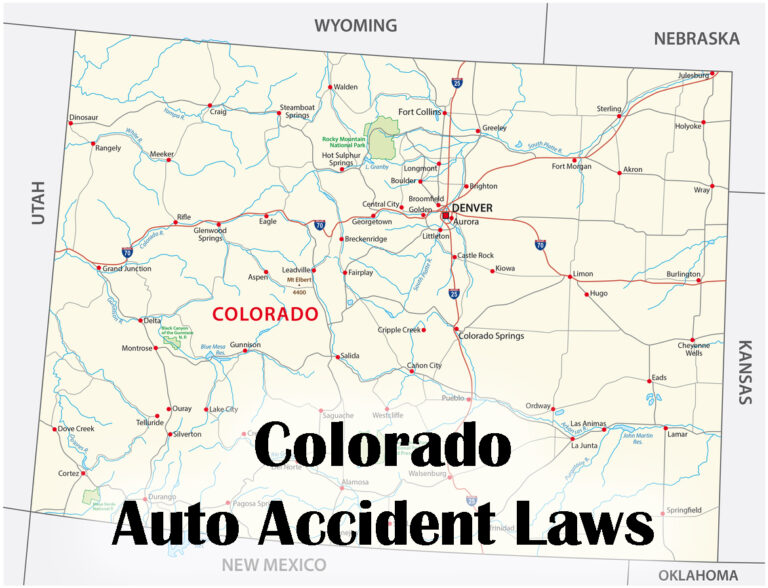Car Accident Laws in Colorado Plus FAQ’s
Car Accident Laws in Colorado Explained
Car accidents can cause lots of problems aside from potential injuries and property damage. When you want to file a lawsuit regarding an auto accident that you have been in, you might have to prepare for a long process. Are you wondering what the Colorado car accident laws are? They typically vary from state to state, but this guide can help you determine just what laws apply to the state if you’re ever involved in an accident. From financial responsibilities to statute of limitations, it’s all here.
The Statute of Limitations in Colorado
The Statute of Limitations can vary from state to state, and it’s a law that specifies the time limit on a plaintiff’s right to file a lawsuit. The deadlines can vary based on the kind of harm that has been suffered as well as the kind of case that you want to file. This doesn’t apply to car insurance claims, but solely for police reports.
In most states, the statute of limitations will apply to car accident lawsuits just like they would to larger ones in personal injury cases where one person is negligent and is said to have caused injury to another. However, in the state of Colorado, the states that a specific deadline applies to lawsuits over car accidents in terms of personal injury, damage to a vehicle, or both.
More specifically, sections of the Statute of Limitations laws state that injury claims that come from any kind of vehicle accident, regardless of whether it’s by a driver, passenger, bicyclist, motorcyclist, pedestrian, or electric scooter rider, must be filed within 3 years from the date of the accident. This same deadline will also apply for lawsuits for vehicle damage that has been caused by a car accident.
If the result of a car accident in Colorado is death and the family of the person wants to file a wrongful death claim, the deadline for the statute of limitations will be 2 years from the date of the person’s death – this can be different from the date of the accident.
Auto Insurance Requirements in Colorado
Car insurance is a requirement in Colorado, and it can play a part in practically any claim that is made after the accident. Most car insurance is certain to play a part in any claim that’s made after a car accident. Colorado, like most states, requires vehicle owners to maintain certain minimum amounts of liability coverage. So, understanding the Colorado auto insurance rules is essential to any potential car accident case.
When to Report a Car Accident
If you had a car accident in Colorado, it’s essential for you to report the accident. Each driver has legal responsibilities that they must follow even after an accident. A driver that is involved in an auto accident is required to report the crash if it has resulted in:
- Injury, serious bodily injury, or death of any person
- Any kind of property damage
The car accident should be reported to the local police department, even if no one was hurt and as long as one or more vehicles have incurred even a minor amount of damage. Essentially, this means that practically every accident should be reported. It’s also crucial for you to obtain a copy of the police report that was made on the site of the accident by law enforcement officials.
Comparative Negligence in Colorado
In a situation where there is more than one part at least partially at fault for an auto accident, this will refer to comparative fault. One can recover against a party who was more at fault than the other, but the damages or financial recovery will be reduced by the percentage that corresponds to the share of liability, in a personal injury lawsuit.
Since there is no precise method to an appropriate fault, the final decision about who is at fault will depend on the ability of the persons involved to negotiate with the insurance claim adjuster or to convince the judge or jury.
If your share of fault for the auto accident meets or exceeds 50%, under Colorado law, you will not be able to recover anything at all due to the modified comparative negligence rule.
Damage Caps
Car accident laws in Colorado also include damage caps which mean that you can’t recover more than the state-imposed max compensation for the damages. The caps limit the recovery to $250,000 or $500,000 in terms of pain and suffering damages and the same amount regarding wrongful death damages. $150,000 is for a dram shop claim and for punitive damages, no more than the plaintiff’s actual damage award will be recovered. There are some exceptions, like if you have permanently impairing injuries that apply to the auto accident case. An auto accident attorney can help you both understand if you have a case and how to move forward with filing a lawsuit regarding your situation.
Find An Auto Accident Attorney In Your Area
Auto Accident FAQ

